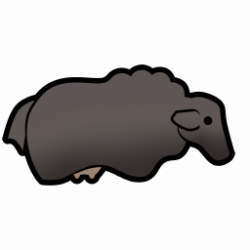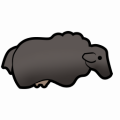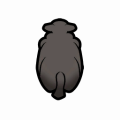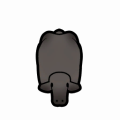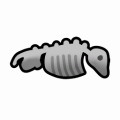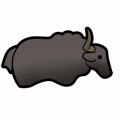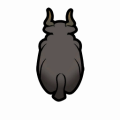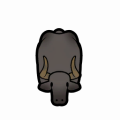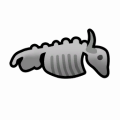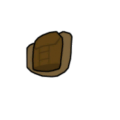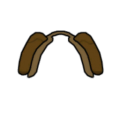Difference between revisions of "Yak"
(gallery) |
|||
| (4 intermediate revisions by 4 users not shown) | |||
| Line 13: | Line 13: | ||
| milk = 11 | | milk = 11 | ||
| herdanimal = true | | herdanimal = true | ||
| + | | combatPower = 75 | ||
| bodysize = 2.1 | | bodysize = 2.1 | ||
| healthscale = 1.5 | | healthscale = 1.5 | ||
| Line 64: | Line 65: | ||
| livesin_coldbog = 0.2 | | livesin_coldbog = 0.2 | ||
}} | }} | ||
| − | '''Yaks''' are tameable [[herbivore]]s with a medium movement speed. Yaks are one of the easiest [[pack animal]]s to tame. Males of the species can be distinguished by their horns and lack of udders, while females have the opposite. | + | '''Yaks''', called '''yak calves''' as babies, are tameable [[herbivore]]s with a medium movement speed. Yaks are one of the easiest [[pack animal]]s to tame. Males of the species can be distinguished by their horns and lack of udders, while females have the opposite. |
== Obtaining == | == Obtaining == | ||
| Line 90: | Line 91: | ||
=== Comparisons === | === Comparisons === | ||
| − | [[Cow]]s produce more milk and more meat than yaks. However, yaks | + | [[Cow]]s produce more milk and more meat than yaks. However, yaks are [[pack animal]]s, and fare much better against the cold. Yaks can also be found in the wild, while cows must be bought. |
[[Dromedaries]] are a more direct competitor to yaks. They are both pack animals that produce milk, but yaks produce {{#expr: (({{P|Daily Milk Average}}/{{Q|Dromedary|Daily Milk Average}})-1)*100 round 0}}% more milk on average, while dromedaries allow riders to speed up caravans. They are otherwise very similar - carrying the same load and eating the same amount. Dromedaries can be found in warmer biomes while yaks can be found in colder biomes. | [[Dromedaries]] are a more direct competitor to yaks. They are both pack animals that produce milk, but yaks produce {{#expr: (({{P|Daily Milk Average}}/{{Q|Dromedary|Daily Milk Average}})-1)*100 round 0}}% more milk on average, while dromedaries allow riders to speed up caravans. They are otherwise very similar - carrying the same load and eating the same amount. Dromedaries can be found in warmer biomes while yaks can be found in colder biomes. | ||
| Line 98: | Line 99: | ||
== Health == | == Health == | ||
| − | {{Animal Health Table}} | + | {{Animal Health Table|QuadrupedAnimalWithHooves}} |
== Version history == | == Version history == | ||
| Line 109: | Line 110: | ||
Yak female north.png|Female yak facing north | Yak female north.png|Female yak facing north | ||
Yak female south.png|Female yak facing south | Yak female south.png|Female yak facing south | ||
| + | Dessicated yak female east.png|Decaying female yak | ||
</gallery> | </gallery> | ||
<gallery> | <gallery> | ||
| Line 114: | Line 116: | ||
Yak male north.png|Male yak facing north | Yak male north.png|Male yak facing north | ||
Yak male south.png|Male yak facing south | Yak male south.png|Male yak facing south | ||
| + | Dessicated yak male east.png|Decaying male yak | ||
</gallery> | </gallery> | ||
<gallery><!-- The packing bags for the yak have the same texture as for the bison. --> | <gallery><!-- The packing bags for the yak have the same texture as for the bison. --> | ||
Latest revision as of 06:23, 9 November 2024
Yak
Yaks are robust cattle with a bulky frame, short but thick legs, and rounded cloven hooves that are splayed to help them walk in snow.
Base Stats
- Type
- Animal
- Flammability
- 70%
Pawn Stats
- Combat Power
- 75
- Move Speed
- 3.2 c/s
- Health Scale
- 150% HP
- Body Size
- 2.1
- Mass - Baby
- 25.2 kg
- Mass - Juvenile
- 63 kg
- Mass - Adult
- 126 kg
- Pack Capacity
- 73.5 kg
- Carrying Capacity
- 158 kg
- Filth Rate
- 16
- Hunger Rate
- 0.86 Nutrition/Day
- Diet
- herbivorous
- Life Expectancy
- 22 years
- Manhunter Chance
- 0%
- Manhunter Chance (Taming)
- 0%
- Trainable Intelligence
- None
- Wildness
- 20%
- Minimum Handling Skill
- 1
- Roam Interval
- 2 days
- Mate Interval
- 12 hours
- Maturity Age
- 0.333 years (20 days)
- Juvenile Age
- 0.2 years (12 days)
- Comfortable Temp Range
- -45 °C – 40 °C (-49 °F – 104 °F)
Production
- Meat Yield
- 294
 yak beef
yak beef - Leather Yield
- 84
 plainleather
plainleather - Milk Amount
- 11
 milk
milk - Milking Interval
- 1 days
- Gestation Period
- 6.66 days
- Offspring Per Birth
- 1
Melee Combat
- Attack 1
- Teeth
8.8 dmg (Bite)
13 % AP
2.6 second cooldown
0.7 chance factor - Attack 2
- Head
9 dmg (Blunt)
13 % AP
2 second cooldown
0.2 chance factor - Attack 3
- Front left leg
8 dmg (Blunt)
12 % AP
2 second cooldown - Attack 4
- Front left leg
8 dmg (Poke)
12 % AP
2 second cooldown - Attack 5
- Front right leg
8 dmg (Blunt)
12 % AP
2 second cooldown - Attack 6
- Front right leg
8 dmg (Poke)
12 % AP
2 second cooldown - Average DPS
- 2.47
- tradeTags
- AnimalFarm, AnimalCommon
Yaks, called yak calves as babies, are tameable herbivores with a medium movement speed. Yaks are one of the easiest pack animals to tame. Males of the species can be distinguished by their horns and lack of udders, while females have the opposite.
Obtaining[edit]
Yaks can be found in temperate forests, temperate swamps, boreal forests, and cold bogs. They can either be tamed by a handler or self-tame in a random event.
Yaks can be bought and sold in other faction bases and from bulk goods traders. Yaks purchased from traders will be already tamed.
Summary[edit]
Yaks are pen animals. Once tamed, pen animals cannot and do not need to be trained any further. But if left outside of a pen or caravan hitching spot, pen animals will eventually roam outside your colony. Making a caravan is not required to tie animals to a caravan hitching spot.
A female yak can be milked for up to ![]() 11 units of milk per day (depending on your pawn's Animal Gather Yield).
11 units of milk per day (depending on your pawn's Animal Gather Yield).
Yaks are also pack animals, and will carry up to 73.5kg of weight in a caravan.
Analysis[edit]
Milking[edit]
Female yaks produce ![]() 11 per day, or 0.55 nutrition in milk per day. A yak consumes 0.86 nutrition per day. This results in a nutrition efficiency of 64% from milk alone (or
11 per day, or 0.55 nutrition in milk per day. A yak consumes 0.86 nutrition per day. This results in a nutrition efficiency of 64% from milk alone (or ![]() 12.79 per day per 1 nutrition consumed). Yaks are better for milk than dromedaries or caribou.
12.79 per day per 1 nutrition consumed). Yaks are better for milk than dromedaries or caribou.
Meat[edit]
When slaughtered, a yak yields 59 meat and 23 leather as a calf; 147 meat and 42 as a juvenile; or 294 meat and 84 leather as an adult.
When slaughtering yaks as babies, and including the production of milk, the nutrition efficiency of a population of yaks varies from 58% to 116% depending on how many more female yaks compared to males.
If the yaks are allows to grow to adulthood before they are slaughtered, this changes to 32% - 122.9%.
Comparisons[edit]
Cows produce more milk and more meat than yaks. However, yaks are pack animals, and fare much better against the cold. Yaks can also be found in the wild, while cows must be bought.
Dromedaries are a more direct competitor to yaks. They are both pack animals that produce milk, but yaks produce 22% more milk on average, while dromedaries allow riders to speed up caravans. They are otherwise very similar - carrying the same load and eating the same amount. Dromedaries can be found in warmer biomes while yaks can be found in colder biomes.
Training[edit]
This animal can be trained as follows:
| Guard: | |
|---|---|
| Attack: | |
| Rescue: | |
| Haul: | |
*As of version 1.1.2610, all animals can be tamed. The percentage of likelihood of success depends on factors such as the Animals Wildness Percentage, Pawn Handling Skill, and others. More information can be found on the animals page.
Health[edit]
| Part Name | Health | Quantity | Coverage[1] | Target Chance[2] | Subpart of | Internal | Capacity[3] | Effect if Destroyed/Removed |
|---|---|---|---|---|---|---|---|---|
| Body | 60 | 1 | 100% | 26% | N/A[4] | - | Death | |
| Spine | 37.5 | 1 | 3% | 3% | Body | Moving |
−100% Moving[5] | |
| Stomach | 30 | 1 | 3% | 3% | Body | Digestion |
−50% Digestion | |
| Heart | 22.5 | 1 | 3% | 3% | Body | Blood Pumping |
Death | |
| Lung | 22.5 | 2 | 3% | 3% | Body | Breathing |
−50% Breathing. Death if both lost. | |
| Kidney | 22.5 | 2 | 3% | 3% | Body | Blood Filtration | −50% Blood Filtration. Death if both lost. | |
| Liver | 30 | 1 | 3% | 3% | Body | Digestion |
Death | |
| Neck | 37.5 | 1 | 22% | 5.5% | Body | Eating Talking Breathing |
Death | |
| Head | 37.5 | 1 | 75% | 2.475% | Neck | - | Death | |
| Skull | 37.5 | 1 | 25% | 1.2375% | Head | - | Cannot be destroyed Increasing Pain based on damage. | |
| Brain | 15 | 1 | 70% | 2.8875% | Skull | Consciousness |
Death Damage always results in scarring. | |
| Eye | 15 | 2 | 12% | 1.98% | Head | Sight |
−25% Sight. −100% if both lost. Damage always results in scarring. 0% Hit Chance against Blunt damage. | |
| Ear | 18 | 2 | 8% | 1.32% | Head | Hearing |
−25% Hearing. −100% if both lost. | |
| Nose | 15 | 1 | 10% | 1.65% | Head | - | - | |
| AnimalJaw | 15 | 1 | 10% | 1.65% | Head | Manipulation |
−100% Manipulation. Can no longer use Bite attack. | |
| Front Leg | 45 | 2 | 7% | 5.95% | Body | Moving |
−25% Moving. −50% if both lost. Can no longer use Hoof attack.[6] | |
| Front Hoof | 15 | 2 | 15% | 1.05% | Front Leg | Moving |
−25% Moving. −50% if both lost. | |
| Rear Leg | 45 | 2 | 7% | 5.95% | Body | Moving |
−25% Moving. −50% if both lost. | |
| Rear Hoof | 15 | 2 | 15% | 1.05% | Rear Leg | Moving |
−25% Moving. −50% if both lost. |
- ↑ Coverage determines the chance to hit this body part. It refers to the percentage of the super-part that this part covers, before its own sub-parts claim their own percentage. For example, if the base coverage of the super-part is 100%, and the coverage of the part is 20%, 20% of hits would hit the part, and 80% the super-part. If the part had its own sub-part with 50% coverage, the chances would be 10% sub-part, 10% part, 80% super part.
- ↑ Target Chance is the actual chance for each part to be be selected as the target when each part's coverage has been taken into account(I.E. Neck covers 7.5% of Torso but Head covers 80% of Neck so it actually has only a 1.5% chance to be selected). This is not pure hit chance, as different damage types propagate damage in different ways. See that page for details.
- ↑ Note that capacities can affect other capacities in turn. Only the primary effect is listed. See specific pages for details.
- ↑ This is the part that everything else connects to to be considered 'connected'.
- ↑ If Moving drops below 16% a pawn cannot move.
- ↑ A Blunt/Poke attack with cooldown of 2s. The actual Hoof is unrelated
Version history[edit]
- 1.1.0 - Added as part of the integration of the Vanilla Animals Expanded - Livestock mod into the basegame.
- 1.1.2559 - Decrease minimum comfortable temperature
